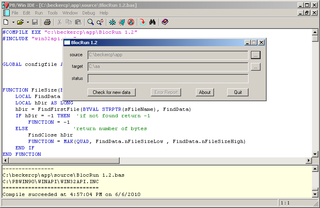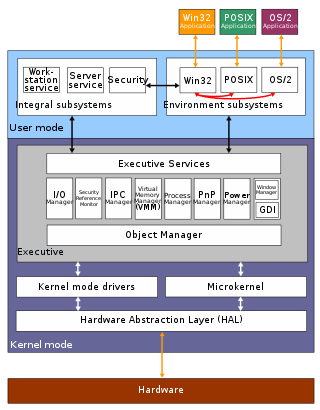Related Research Articles
Pascal is an imperative and procedural programming language, designed by Niklaus Wirth as a small, efficient language intended to encourage good programming practices using structured programming and data structuring. It is named after French mathematician, philosopher and physicist Blaise Pascal.

Allegro is a software library for video game development. The functionality of the library includes support for basic 2D graphics, image manipulation, text output, audio output, MIDI music, input and timers, as well as additional routines for fixed-point and floating-point matrix arithmetic, Unicode strings, file system access, file manipulation, data files, and 3D graphics. The library is written in the C programming language and designed to be used with C, C++, or Objective-C, with bindings available for Python, Lua, Scheme, D, Go, and other languages. Allegro comes with extensive documentation and many examples.

PowerBASIC, formerly Turbo Basic, is the brand of several commercial compilers by PowerBASIC Inc. that compile a dialect of the BASIC programming language. There are both MS-DOS and Windows versions, and two kinds of the latter: Console and Windows. The MS-DOS version has a syntax similar to that of QBasic and QuickBASIC. The Windows versions use a BASIC syntax expanded to include many Windows functions, and the statements can be combined with calls to the Windows API.

The Windows API, informally WinAPI, is the foundational application programming interface (API) that allows a computer program to access the features of the Microsoft Windows operating system in which the program is running.
In computer programming, standard streams are preconnected input and output communication channels between a computer program and its environment when it begins execution. The three input/output (I/O) connections are called standard input (stdin), standard output (stdout) and standard error (stderr). Originally I/O happened via a physically connected system console, but standard streams abstract this. When a command is executed via an interactive shell, the streams are typically connected to the text terminal on which the shell is running, but can be changed with redirection or a pipeline. More generally, a child process inherits the standard streams of its parent process.
The C standard library or libc is the standard library for the C programming language, as specified in the ISO C standard. Starting from the original ANSI C standard, it was developed at the same time as the C library POSIX specification, which is a superset of it. Since ANSI C was adopted by the International Organization for Standardization, the C standard library is also called the ISO C library.

In computing, text-based user interfaces (TUI), is a retronym describing a type of user interface (UI) common as an early form of human–computer interaction, before the advent of bitmapped displays and modern conventional graphical user interfaces (GUIs). Like modern GUIs, they can use the entire screen area and may accept mouse and other inputs. They may also use color and often structure the display using box-drawing characters such as ┌ and ╣. The modern context of use is usually a terminal emulator.
Object Pascal is an extension to the programming language Pascal that provides object-oriented programming (OOP) features such as classes and methods.

Free Pascal Compiler (FPC) is a compiler for the closely related programming-language dialects Pascal and Object Pascal. It is free software released under the GNU General Public License, with exception clauses that allow static linking against its runtime libraries and packages for any purpose in combination with any other software license.
In computing, gettext is an internationalization and localization system commonly used for writing multilingual programs on Unix-like computer operating systems. One of the main benefits of gettext is that it separates programming from translating. The most commonly used implementation of gettext is GNU gettext, released by the GNU Project in 1995. The runtime library is libintl. gettext provides an option to use different strings for any number of plural forms of nouns, but this feature has no support for grammatical gender. The main filename extensions used by this system are .POT, .PO and .MO.

Windows Console is the infrastructure for console applications in Microsoft Windows. An instance of a Windows Console has a screen buffer and an input buffer. It allows console apps to run inside a window or in hardware text mode. The user can switch between the two using the Alt+↵ Enter key combination. The text mode is unavailable in Windows Vista and later. Starting with Windows 10, however, a native full-screen mode is available.

cc65 is a cross development package for 6502 and 65C02 targets, including a macro assembler, a C cross compiler, linker, librarian and several other tools.

In computing, more is a command to view the contents of a text file one screen at a time. It is available on Unix and Unix-like systems, DOS, Digital Research FlexOS, IBM/Toshiba 4690 OS, IBM OS/2, Microsoft Windows and ReactOS. Programs of this sort are called pagers. more is a very basic pager, originally allowing only forward navigation through a file, though newer implementations do allow for limited backward movement.
In computing, tee is a command in command-line interpreters (shells) using standard streams which reads standard input and writes it to both standard output and one or more files, effectively duplicating its input. It is primarily used in conjunction with pipes and filters. The command is named after the T-splitter used in plumbing.

Mathomatic is a free, portable, general-purpose computer algebra system (CAS) that can symbolically solve, simplify, combine and compare algebraic equations, and can perform complex number, modular, and polynomial arithmetic, along with standard arithmetic. It can perform symbolic calculus (derivative, extrema, Taylor series, and polynomial integration and Laplace transforms), numerical integration, and can handle all elementary algebra except logarithms. Trigonometric functions can be entered and manipulated using complex exponentials, with the GNU m4 preprocessor. Not currently implemented are general functions such as f(x), arbitrary-precision and interval arithmetic, as well as matrices.

In software development, CMake is cross-platform free and open-source software for build automation, testing, packaging and installation of software by using a compiler-independent method. CMake is not a build system itself; it generates another system's build files. It supports directory hierarchies and applications that depend on multiple libraries. It can invoke native build environments such as Make, Qt Creator, Ninja, Android Studio, Apple's Xcode, and Microsoft Visual Studio. It has minimal dependencies, requiring only a C++ compiler on its own build system.
process.h is a C header file which contains function declarations and macros used in working with threads and processes. Most C compilers that target DOS, Windows 3.1x, Win32, OS/2, Novell NetWare or DOS extenders supply this header and the library functions in their C library. Neither the header file nor most of the functions are defined by either the ANSI/ISO C standard or by POSIX.

The Borland Graphics Interface, also known as BGI, was a graphics library bundled with several Borland compilers for the DOS operating systems since 1987. BGI was also used to provide graphics for many other Borland products including the Quattro Pro spreadsheet.

A command-line interface (CLI) is a means of interacting with a computer program by inputting lines of text called command-lines. Command-line interfaces emerged in the mid-1960s, on computer terminals, as an interactive and more user-friendly alternative to the non-interactive interface available with punched cards.
References
- ↑ Schildt, Herbert (1995). C: The Complete Reference (3rd ed.). Berkeley, Calif.: Osborne McGraw-Hill. p. 288. ISBN 0-07-882101-0.
For DOS-compatible compilers, the direct console I/O functions generally use the CONIO.H header file.
- ↑ "Console and Port I/O in MSDN".
- ↑ "MicroVGA conio Text User Interface Library".
- ↑ "DJGPP C Library Reference – conio". libc.a reference. Retrieved January 22, 2022.